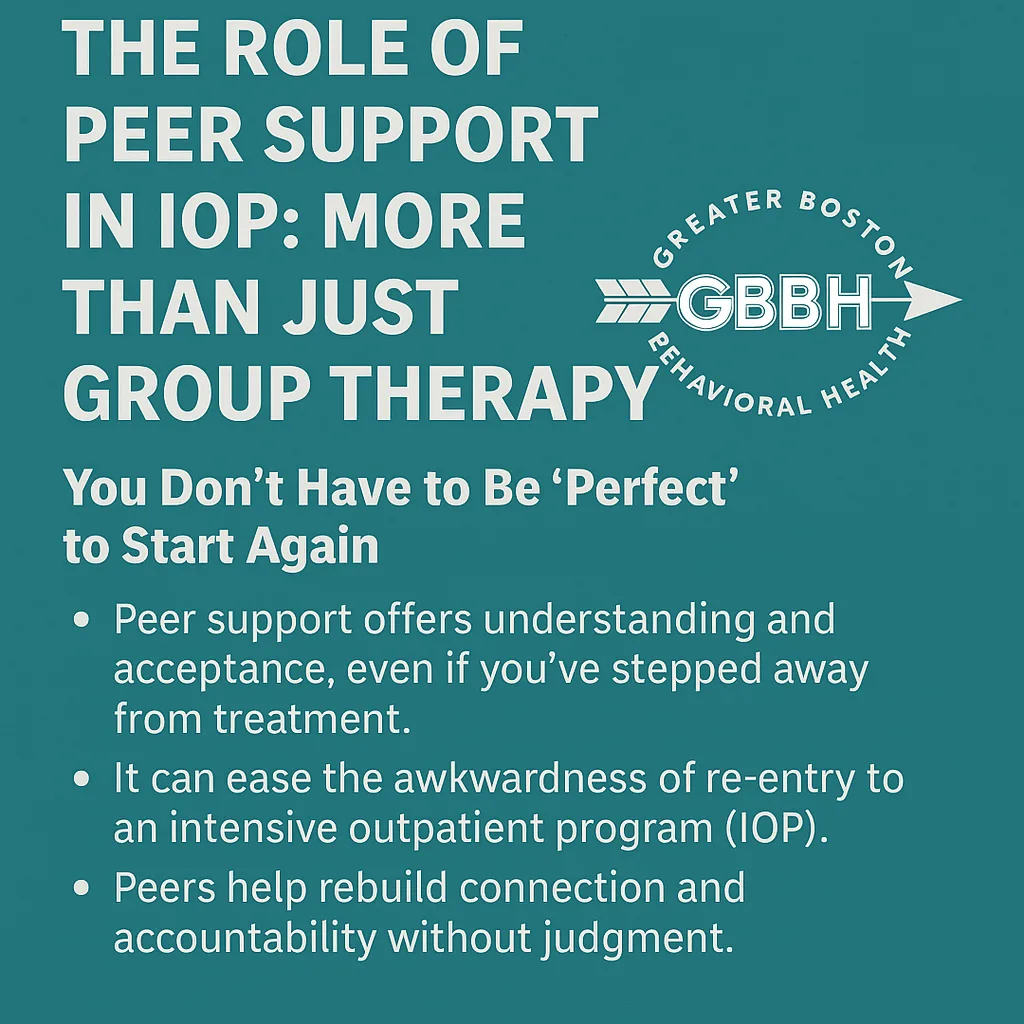If you’ve stepped away from treatment, skipped sessions, or even ghosted your program, it doesn’t mean you’ve failed. It just means you hit a wall—and you’re not the first. At Greater Boston Behavioral Health, we see it all the time: folks who feel like they’ve messed up so badly they can’t come back. But here’s the thing: the door is still open.
In fact, if there’s one thing peer support teaches you in an intensive outpatient program, it’s this—nobody comes through these doors perfect. We come through messy, awkward, late, scared—and that’s enough. That’s the real work starting again.
What Peer Support Really Looks Like in an Intensive Outpatient Program
When people hear “peer support,” they usually think group therapy. But it’s not the same. Group therapy is where a licensed therapist guides discussion with therapeutic goals. Peer support, though? That’s the after-group chats, the knowing glances when someone shares something painful, the text you get from someone you met last week asking if you’re coming back tomorrow.
In Boston’s IOP settings, peer support often looks like:
- A buddy who knows what it’s like to ghost treatment and come back.
- A peer recovery specialist who checks in without judgment.
- Group members who don’t flinch when you admit you’re struggling.
- Real stories, not clinical lectures.
It’s about connection—raw, honest, and sometimes messy—but always human.
Why Peer Support Makes Re-Entry Less Awkward
If you’ve ever ghosted your IOP program, you know the feeling: that lump in your throat walking back in, wondering if you’ll get the side-eye. Here’s the truth—peer-supported programs expect this. They don’t penalize you for disappearing. They’re built to welcome you back without making you grovel.
At Greater Boston Behavioral Health, our peers make it easier:
- No shame trips.
- No twenty-questions about why you left.
- Just “we’re glad you’re back.”
It’s what makes the difference between staying stuck and reconnecting.
If you’re looking for an intensive outpatient program in Boston, MA, check out our local IOP options.
Peer Support Builds Accountability That Actually Feels Good
Let’s be honest: accountability gets a bad rap. It can feel like pressure or punishment. But peer accountability flips that script. It’s not about getting scolded—it’s about having people who want to see you do well because they’ve been in your shoes.
Here’s what it can look like in IOP:
- Someone checking in because they noticed you weren’t in group.
- A friend reminding you why you came here in the first place.
- Shared rides or walk-ins to help you actually show up.
And it’s two-way: you’ll find yourself caring about others’ progress, too. Suddenly, showing up isn’t just about you—it’s about not leaving someone else hanging.
In Dedham? Our intensive outpatient program in Dedham, MA offers the same human-first approach.
IOP Isn’t Just Schedules—It’s About Belonging Again
One of the worst feelings when you drop out of treatment is that loss of connection. You drift. You isolate. You start to believe the lie that no one cares. Peer support in IOP breaks through that isolation.
It gives you a place where:
- You can be honest, even when you’ve been struggling.
- You can laugh with people who’ve been through the same dark spots.
- You can rebuild trust, both in yourself and in others.
That’s not something you get from just ticking boxes on a treatment schedule. That’s the heart of recovery—learning you still belong.
What Happens When Peer Support Clicks: A Quick Story
A guy I knew in group disappeared for three weeks. Showed up again out of nowhere, didn’t say much. After group, I just said, “I’m glad you came back.” That was it. Later, he told me that moment was what kept him coming back. Not the therapy notes, not the homework—just someone being glad he showed up.
That’s what IOP with peer support can do. It keeps the door open without asking for perfection.
Quick Tips for Reconnecting After Dropping Out
H3: Getting Back Into IOP Doesn’t Have to Be Complicated
- Don’t wait until you “feel ready”—just reach out.
- You don’t have to explain your absence; “I want to come back” is enough.
- Ask if there’s a peer mentor you can connect with before your first group back.
- Expect it to feel weird at first—normal doesn’t happen overnight.
- Celebrate the fact that you’re trying again, no matter how many “starts” it takes.
FAQ: Coming Back to IOP and Peer Support
Is it normal to ghost IOP and still come back?
Absolutely. Many people in intensive outpatient programs step away at some point. What matters is coming back—not how many times you left.
Do I have to start over if I come back?
Not usually. Most programs, like ours at Greater Boston Behavioral Health, will help you pick up where you left off, adjusting your care plan if needed.
Is peer support part of every IOP?
Not always. Some IOPs only offer clinical group therapy. Programs like ours include structured peer recovery support alongside therapy to help with real-life accountability and connection.
What if I feel like everyone else is farther along?
That feeling is common, but it’s not reality. Everyone struggles in different ways. Peer support helps you realize that “progress” doesn’t look the same for everyone—and that’s okay.
How do I know if IOP is the right step after dropping out?
If you’re thinking about getting back on track but feel overwhelmed by full-time treatment, IOP is a flexible, supportive option to reconnect without needing inpatient care.
You’re Welcome Back—Every Time, Every Attempt
Your worth isn’t measured by attendance sheets or perfect progress. If you’ve been out of step with your IOP program, peer support makes sure there’s always a way back in. At Greater Boston Behavioral Health, we believe every attempt counts—and we’ll meet you right where you are.
Ready to reconnect? Call (888) 450-3097 or visit Greater Boston Behavioral Health’s intensive outpatient program in Boston, Massachusetts and take that first step back on your terms. If you’re local to Newton, Dedham, Needham, Wellesley, or Boston, Massachusetts, GBBH offers help that meets you exactly where you are.


